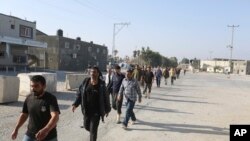The Kerem Shalom checkpoint was responsible for 60% of goods getting into the besieged Palestinian territory before October 7 and the start of the war between Israel and Hamas.
Griffiths said that in recent days there had been signs that Israel and Gaza's key neighbor Egypt have become much more open to the idea of gradually reopening Kerem Shalom.
The crossing sits on the triple border between Israel, Gaza and Egypt.
"We're still negotiating, and with some promising signs at the moment" that access through Kerem Shalom would soon be possible, Griffiths told a press conference in Geneva.
But Israel poured cold water on the idea of fully reopening the crossing, telling AFP following Griffiths's comments that it would only allow aid truck inspections there, before directing supplies towards the Rafah Crossing, between Egypt and Gaza.
"We will allow a security check of humanitarian aid trucks at the Kerem Shalom crossing, but not trucks crossing to Gaza," said a spokesman for the Israeli defense ministry body responsible for Palestinian civilian affairs, COGAT.
An Israeli siege has seen only limited supplies of food, water, fuel and medicines enter the Gaza Strip, triggering dire shortages.
The Rafah border crossing with Egypt is the only one currently open for aid to flow into Gaza.
"We have been arguing for the opening of Kerem Shalom... to go straight through Kerem Shalom up into the northern parts of Gaza, or wherever the need is greatest," Griffiths said.
"If we get that, it will be the first miracle we've seen for some weeks, but it will be a huge boost to the logistical process... it would change the nature of humanitarian access."
Potential Jordan route
Israel declared war on Hamas after the militant group's unprecedented October 7 attack that killed 1,200 people, mostly civilians, according to Israeli authorities, and saw around 240 hostages taken into Gaza.
The Hamas-run government media office says more than 17,000 people in Gaza, most of them women and children, have been killed in a retaliatory Israeli assault.
Israel has vowed to destroy Hamas and free 138 hostages still held after scores were released during a short-lived truce.
Griffiths added that there were also discussions on the possibility of driving aid to the Gaza Strip from Jordan, via the Allenby Bridge crossing into the Israeli-occupied West Bank.
A representative in Jordan was "already lining up the potential deliveries of aid by land ... from Jordan over the Allenby Bridge, straight to Kerem Shalom," he said.
'Horsemen of the apocalypse'
On the situation inside the Gaza Strip, Griffiths said the territory was being stalked by hunger and deprivation.
"There are two horsemen of the apocalypse in Gaza today: conflict, of course, but also disease, and that will only get worse as we are unable to sustain any supplies to hospitals," he said.
"The pointers are going in the wrong direction — all of them."
Griffiths said southern Gaza had been the cornerstone of international humanitarian plans to protect civilians and administer aid to them.
But now, "without places of safety, that plan is in tatters," he said, calling the current circumstances, "at best, humanitarian opportunism."
"It's erratic, it's undependable and frankly, it's not sustainable."
The British diplomat said there was no sense of clarity, planning or what the coming days may bring.
"None of us can see where this will end," he said.









Forum